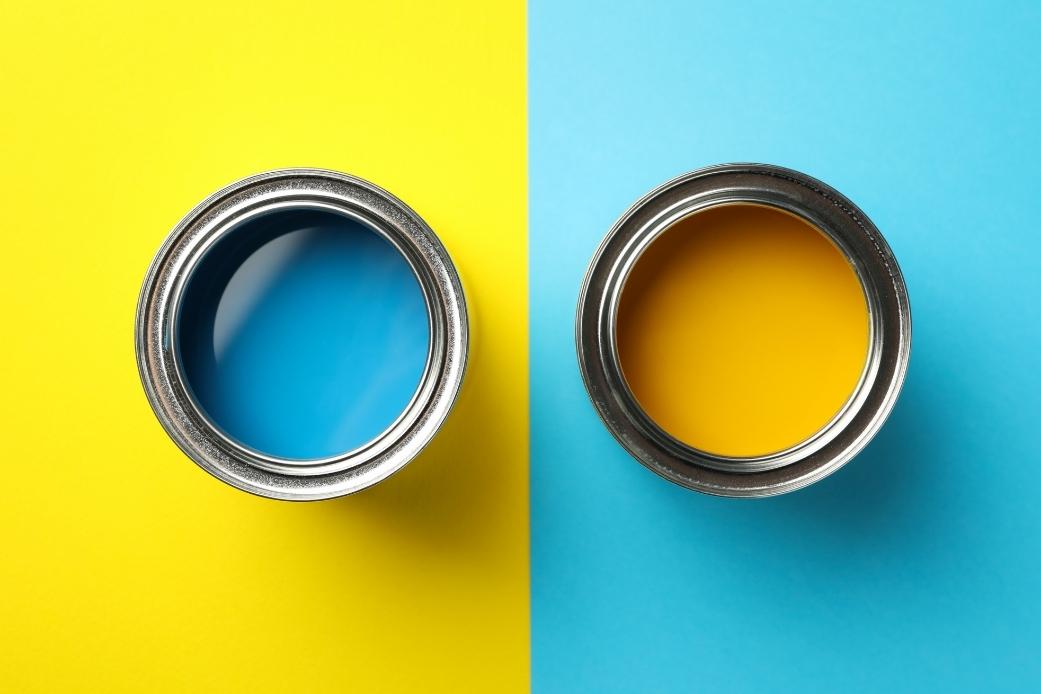
Water-based or solvent-based paint? The differences explained!
We often get questions about the difference between water-based and solvent-based paint. In this blog post, we will tell you with great pleasure more about the differences between the two paints!
The basics
Let’s start with some technical information. Paint consists of a number of components, the 'ingredients' so to speak. You need a binder to create the actual paint layer and associated properties, pigment to give the paint its colour and opacity, and sometimes other excipients or fillers.
Furthermore, paint also contains a solvent, a liquid in which the components are dissolved to make the paint workable. The solvent evaporates after painting, when the paint dries. It is in this aspect that water-based paints and synthetic paints differ. Whereas in water-based paints the solvent is water, it is a solvent, such as white spirit, in solvent-based paints.
The characteristics
Because of their different bases, the two types of paint also have some different characteristics. Below, we list some of the advantages of water-based paint for you.
-
One very noticeable difference is that water-based paints are odourless. This is because water has no odour, whereas solvents have a rather penetrating odour.
-
Of course, it is not just the smell of synthetic paints that is in the air, but also the volatiles. With water-based paint, you don't inhale any harmful substances.
Consequently, water-based paint is also much more environmentally friendly than solvent-based paint. In recent years, more and more water-based paints have appeared on to the market.
- Water-based paint also has some technical advantages, such as a short drying period, for example.
-
Water-based paints have an edge in that they do not yellow over time, which often happens with synthetic paints. They also have better colour retention.
-
The only drawback seems to be that synthetic lacquers are considered stronger. The emphasis here is on 'seems'. We will be happy to explain below why this is not necessarily the case.
Is synthetic paint more durable?
Until a few years ago, it could be argued that water-based paint systems were not as strong as their solvent-based counterparts. Today, however, that story is long outdated. Technology continues to develop every day, and so does paint.
There is a small 'but' to it though: you absolutely have to use the paint correctly. Water-based paints can be rolled out very well and smoothly, whereas synthetic paints are a bit harder to process. In addition, solvent-based paints leave a bit more solid matter after drying than water-based paints.
As a result, you have a bit less coating thickness
with water-based paints. If you don't notice this, your paint system will
indeed be less strong. If you apply an extra layer or lay the paint a little
thicker, water-based paint will certainly be just as strong!
Which paint do I use indoors and which one outdoors?
If you were still wondering if there is water-based paint for outdoors: the answer is yes!
We have no preference to use either paint only indoors or only outdoors. A lot depends on the properties you want from the paint (see above), and what is stated in the paint's technical data sheet. Many paints can be used both indoors and outdoors.
You should of course bear in mind that solvent-based paints are less pleasant to use indoors. Synthetic stain does have a slight advantage for exterior use: it penetrates the substrate a little more. For indoors, you will find few wall paints that are not water-based.
Can you paint with water-based over solvent-based paint?
Again, the answer is yes! Waterbased paints can be applied over solvent-based paints, provided you prepare the substrate correctly.
Conversely, we prefer to be a little more cautious. Although you may read here and there that it is possible, we would rather not recommend painting with solvent-based paint over water-based paint. There is a real chance that you will encouter problems such as cracking or detachment. This is because both paints have a different surface tension: water-based paint is flexible and synthetic is hard. You could compare it to flooring. You could put a nice soft carpet on a laminate floor, but vice versa it would not give such a great result.
Do you have any questions about water-based or solvent-based paint? Feel free to post them in the comments below or contact us. Our experts are happy to help you!
Follow us on Facebook and Instagram for more information and tips or subscribe to our newsletter.


























